| Listing 1 - 10 of 10 |
Sort by
|
Book
ISBN: 882225032X 9788822250322 Year: 2001 Volume: 197 Publisher: Firenze : Olschki,
Abstract | Keywords | Export | Availability | Bookmark
 Loading...
Loading...Choose an application
- Reference Manager
- EndNote
- RefWorks (Direct export to RefWorks)
Book
ISBN: 3515031405 9783515031400 Year: 1979 Volume: 1979/4 Publisher: Mainz Akademie der Wissenschaften und der Literatur
Abstract | Keywords | Export | Availability | Bookmark
 Loading...
Loading...Choose an application
- Reference Manager
- EndNote
- RefWorks (Direct export to RefWorks)
Didactic poetry, Greek --- Fishing in literature --- Fishes in literature --- Fishing --- History and criticism --- Oppian, --- -Fishing --- -Fishing in literature --- Angling --- Recreational fishing --- Sport fishing --- Sportfishing --- Aquatic sports --- Wildlife-related recreation --- Fishes --- Greek didactic poetry --- Greek poetry --- Oppian --- Eutecnius --- Euteknios --- Eutecnius, --- Eutechnius, --- Eutecnius. --- Didactic poetry, Greek - History and criticism --- Fishing - Greece --- Oppian, - active 2nd century - Halieutica
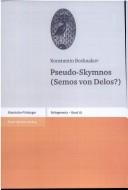
ISBN: 3515083936 9783515083935 Year: 2004 Volume: 82 Publisher: Stuttgart Steiner
Abstract | Keywords | Export | Availability | Bookmark
 Loading...
Loading...Choose an application
- Reference Manager
- EndNote
- RefWorks (Direct export to RefWorks)
Didactic poetry, Greek --- Geography, Ancient, in literature --- History and criticism --- Pseudo-Scymnus --- Black Sea --- In literature --- Pseudo-Scymnus. --- Chernoe more --- Chernoye more --- Chorne more --- Euxine Sea --- Karadeniz --- Marea Neagră --- Pontus Euxinus --- In literature. --- Didactic poetry, Greek - History and criticism --- Pseudo-Scymnus - Orbis descriptio --- Black Sea - In literature
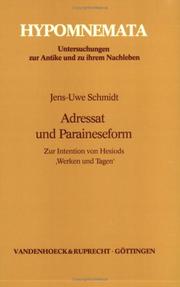
ISBN: 3525251858 9783525251850 Year: 1987 Volume: 86 Publisher: Göttingen Vandenhoeck & Ruprecht
Abstract | Keywords | Export | Availability | Bookmark
 Loading...
Loading...Choose an application
- Reference Manager
- EndNote
- RefWorks (Direct export to RefWorks)
Agriculture in literature --- -Greek didactic poetry --- Seasons in literature. --- Didactic poetry, Greek --- Seasons in literature --- Seasons in poetry --- History and criticism --- Hesiod. --- Greece --- In literature. --- Hesiod --- In literature --- Agriculture in literature. --- History and criticism. --- Didactic poetry, Greek - History and criticism --- Hesiod - Works and days --- Greece - In literature
Book
ISBN: 9780199236343 0199236348 0191717134 9786612383557 1282383558 0191572659 Year: 2010 Publisher: Oxford : Oxford University Press,
Abstract | Keywords | Export | Availability | Bookmark
 Loading...
Loading...Choose an application
- Reference Manager
- EndNote
- RefWorks (Direct export to RefWorks)
Poésie didactique grecque --- Philosophical literature --- Poésie didactique grecque --- Didactic poetry, Greek --- History and criticism. --- Hesiod --- Plato. --- Criticism and interpretation. --- History and criticism --- Plato --- Criticism and interpretation --- Philosophy, Ancient --- Philosophie ancienne --- Histoire et critique --- Philosophical literature - Greece - History and criticism --- Didactic poetry, Greek - History and criticism --- Hesiod - Criticism and interpretation
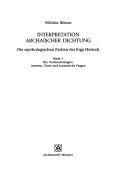
ISBN: 3402054205 9783402054208 Year: 2001 Publisher: München Aschendorff
Abstract | Keywords | Export | Availability | Bookmark
 Loading...
Loading...Choose an application
- Reference Manager
- EndNote
- RefWorks (Direct export to RefWorks)
Didactic poetry, Greek --- Mythology, Greek, in literature. --- Agriculture in literature. --- Farm life in literature. --- Seasons in literature. --- History and criticism. --- Agriculture in literature --- Farm life in literature --- Mythology, Greek, in literature --- Seasons in literature --- Seasons in poetry --- History and criticism --- Hesiod. --- Hesiodus --- Hesiod --- Gesiod --- Geziod --- Esiodo --- Hēsiodos --- Hezjod --- Hésiode --- Hesíodo --- Hesiyodos --- הסיודוס --- Ἡσίοδος --- Knowledge --- Mythology. --- Greece --- In literature. --- Didactic poetry, Greek - History and criticism.
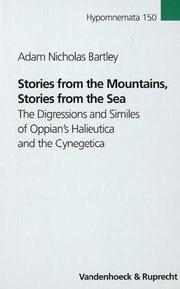
ISBN: 3525252498 9783525252499 Year: 2003 Volume: 150 Publisher: Göttingen : Vandenhoeck & Ruprecht,
Abstract | Keywords | Export | Availability | Bookmark
 Loading...
Loading...Choose an application
- Reference Manager
- EndNote
- RefWorks (Direct export to RefWorks)
Oppian, --- Criticism and interpretation. --- Influence (Literary, artistic, etc.) --- Didactic poetry, Greek --- Epic poetry, Classical --- Mountains in literature. --- Hunting in literature. --- Fishing in literature. --- Digression (Rhetoric) --- Sea in literature. --- Intertextuality. --- Simile. --- History --- History and criticism. --- Appreciation --- Digression (Rhetoric). --- Fishing in literature --- Hunting in literature --- Intertextuality --- Mountains in literature --- Sea in literature --- Simile --- Rhetoric --- Classical epic poetry --- Classical poetry --- Parabole --- Figures of speech --- Ocean in literature --- Criticism --- Semiotics --- History and criticism --- Oppian --- Criticism and interpretation --- Oppian of Apamea --- Influence (Literary, artistic, etc.) - History - To 1500. --- Didactic poetry, Greek - History and criticism. --- Epic poetry, Classical - Appreciation - Greece.
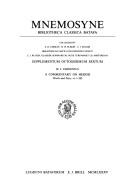
ISBN: 9004074651 9004328211 0585302502 9789004074651 Year: 1985 Volume: 86 Publisher: Leiden Brill
Abstract | Keywords | Export | Availability | Bookmark
 Loading...
Loading...Choose an application
- Reference Manager
- EndNote
- RefWorks (Direct export to RefWorks)
This is a word-for-word commentary on the first part (vv. 1-382) of Hesiod's Works and Days . Special attention has been paid to peculiarities of grammar and idiom, but also to figures of style and the poet's train of thought. All interpretations - many of them which are new - are documented as fully, but at the same time as concisely, as possible. This documentation, which will prove useful for the interpretation of many other texts, has been made more easily accesible by detailed indexes. Discussion of other views plays a considerable part in the commentary and will help the reader avoid a great number of minor and major misunderstandings. The commentary has been confined to the first part of the poem because this seemed to be more in need of a thorough explanation than the rest. It is also the most interesting part in so far as it forms a kind of manual of social morality. The basis concepts of this doctrine are carefully defined in the commentary, and their historical implications are briefly indicated.
Hesiodus --- Greek poetry --- Poésie grecque --- History and criticism --- Histoire et critique --- Hesiod --- Didactic poetry, Greek --- Agriculture in literature --- Greece --- In literature --- -Greek didactic poetry --- Hesiodus. --- Gesiod --- Geziod --- Esiodo --- Hēsiodos --- Hezjod --- Hésiode --- Hesíodo --- Hesiyodos --- הסיודוס --- Ἡσίοδος --- Seasons in literature --- In literature. --- -History and criticism --- Hesiodos --- Poésie grecque --- Seasons in poetry --- Hesiod. --- Criticism and interpretation --- Agriculture in literature. --- Didactic poetry, Greek. --- Literature. --- Seasons in literature. --- Belles-lettres --- Western literature (Western countries) --- World literature --- Philology --- Authors --- Authorship --- Greek didactic poetry --- History and criticism. --- Works and days (Hesiod) --- Erga kai hēmerai (Hesiod) --- Greece. --- al-Yūnān --- Ancient Greece --- Ellada --- Ellas --- Ellēnikē Dēmokratia --- Elliniki Dimokratia --- Grčija --- Grèce --- Grecia --- Gret͡sii͡ --- Griechenland --- Hellada --- Hellas --- Hellenic Republic --- Hellēnikē Dēmokratia --- Kingdom of Greece --- République hellénique --- Royaume de Grèce --- Vasileion tēs Hellados --- Xila --- Yaṿan --- Yūnān --- Didactic poetry, Greek - History and criticism --- Hesiod - Works and days --- Greece - In literature
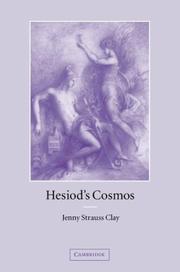
ISBN: 1107137071 128043659X 0511180926 0511062141 0511205074 051130787X 0511482396 0511070608 9780511062148 9780511070600 9780521823920 0521823927 9781280436598 9780511307874 9786610436590 6610436592 9780511482397 9780521117685 0521117682 9781107137073 9780511180927 9780511205071 Year: 2009 Publisher: Cambridge : Cambridge university press,
Abstract | Keywords | Export | Availability | Bookmark
 Loading...
Loading...Choose an application
- Reference Manager
- EndNote
- RefWorks (Direct export to RefWorks)
"Hesiod's Cosmos offers a comprehensive interpretation of both the Theogony and the Works and Days and demonstrates how the two Hesiodic poems must be read together as two halves of an integrated whole embracing both the divine and the human cosmos. After first offering a survey of the structure of both poems, Professor Clay reveals their mutually illuminating unity by offering detailed analyses of their respective poems, their teachings on the origins of the human race, and the two versions of the Prometheus myth. She then examines the role of human beings in the Theogony and the role of the gods in the Works and Days, as well as the position of the hybrid figures of monsters and heroes within the Hesiodic cosmos and in relation to the Hesiodic Catalogue of Women."--Jacket.
Religious poetry, Greek --- Didactic poetry, Greek --- Cosmology, Ancient, in literature. --- Mythology, Greek, in literature. --- Human beings in literature. --- Gods, Greek, in literature. --- Monsters in literature. --- Man in literature --- Greek religious poetry --- Greek poetry --- History and criticism. --- Hesiod. --- Hesiod --- Gesiod --- Geziod --- Esiodo --- Hēsiodos --- Hezjod --- Hésiode --- Hesíodo --- Hesiyodos --- הסיודוס --- Ἡσίοδος --- Knowledge --- Cosmology. --- Cosmology, Ancient, in literature --- Gods, Greek, in literature --- Human beings in literature --- Monsters in literature --- Mythology, Greek, in literature --- History and criticism --- Hesiodus --- Cosmology --- Religious poetry [Greek ] --- Didactic poetry [Greek ] --- Cosmology [Ancient ] in literature --- Mythology [Greek ] in literature --- Gods [Greek ] in literature --- Alceste (Mythologie grecque) dans la littérature. --- Cosmologie antique dans la littérature. --- Didactic poetry, Greek. --- Dieux grecs dans la littérature. --- Homme dans la littérature. --- Kosmologie. --- Literatura grega. --- Monstres dans la littérature. --- Poésie didactique grecque --- Poésie religieuse --- Religious poetry, Greek. --- Wereldbeeld. --- Histoire et critique. --- Hesiodus, --- Hésiode --- Hésiode. --- Hesiodo. --- Hesiodus. --- Et la cosmologie. --- Theogony (Hesiod). --- Works and days (Hesiod). --- Arts and Humanities --- History --- Religious poetry, Greek - History and criticism --- Didactic poetry, Greek - History and criticism --- Hesiod - Theogony --- Hesiod - Works and days --- Hesiod - Knowledge - Cosmology
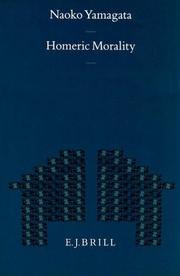
ISBN: 9004098720 9004329366 9789004098725 Year: 1994 Volume: 131 Publisher: Leiden Brill
Abstract | Keywords | Export | Availability | Bookmark
 Loading...
Loading...Choose an application
- Reference Manager
- EndNote
- RefWorks (Direct export to RefWorks)
Homeric Morality is an attempt to answer two questions: whether or not the Homeric gods are concerned with 'justice' in human society, and what mechanism controls the social behaviour of Homeric man. It shows that the gods distribute good and bad fortune to men not in response to their moral behaviour, bus as required by fate; men, however, believe that the gods are concerned with human morality, and subsequently their behaviour is restrained by their faith in the moral gods as well as by many other forces, social and emotional. This volume, taken as a whole, serves as a sustained critique of two influential works in the field, The Justice of Zeus by H. Lloyd- Jones and Merit and Responsibility by A.W.H. Adkins.
Poetry --- Classical Greek literature --- General ethics --- Homer --- Epic poetry, Greek --- Ethics, Ancient, in literature --- Moral conditions in literature --- Gods, Greek, in literature --- Poésie épique grecque --- Morale ancienne dans la littérature --- Conditions morales dans la littérature --- Dieux grecs dans la littérature --- History and criticism --- Histoire et critique --- Ethics. --- Greece --- Grèce --- Moral conditions. --- Conditions morales --- Didactic poetry, Greek --- Mythology, Greek, in literature. --- Ethics, Ancient, in literature. --- Moral conditions in literature. --- Gods, Greek, in literature. --- Ethics in literature. --- History and criticism. --- -Ethics, Ancient, in literature --- -Greek didactic poetry --- Greek poetry --- Greek epic poetry --- Epic poetry, Classical --- -Ethics --- -History and criticism --- -Hóiméar --- Hūmīrūs --- Homeros --- Homerus --- Gomer --- Omir --- Omer --- Omero --- Ho-ma --- Homa --- Homérosz --- האמער --- הומירוס --- הומר --- הומרוס --- هومر --- هوميروس --- 荷马 --- Ὅμηρος --- Гамэр --- Hamėr --- Омир --- Homero --- 호메로스 --- Homerosŭ --- Homērs --- Homeras --- Хомер --- ホメーロス --- ホメロス --- Гомер --- Homeri --- Hema --- Pseudo-Homer --- Pseudo Omero --- Ethics --- -Homer --- Homère --- Poésie épique grecque --- Morale ancienne dans la littérature --- Conditions morales dans la littérature --- Dieux grecs dans la littérature --- Grèce --- Ethics in literature --- Mythology, Greek, in literature --- Hóiméar --- al-Yūnān --- Ancient Greece --- Ellada --- Ellas --- Ellēnikē Dēmokratia --- Elliniki Dimokratia --- Grčija --- Grecia --- Gret︠s︡ii︠a︡ --- Griechenland --- Hellada --- Hellas --- Hellenic Republic --- Hellēnikē Dēmokratia --- Kingdom of Greece --- République hellénique --- Royaume de Grèce --- Vasileion tēs Hellados --- Xila --- Yaṿan --- Yūnān --- Ελληνική Δημοκρατία --- Ελλάς --- Ελλάδα --- Греция --- اليونان --- يونان --- 希腊 --- Didactic poetry, Greek. --- Epic poetry, Greek. --- Morals --- Social history --- Social norms --- Greek gods in literature --- Deontology --- Ethics, Primitive --- Ethology --- Moral philosophy --- Morality --- Philosophy, Moral --- Science, Moral --- Philosophy --- Values --- Greek didactic poetry --- Homer. --- Greece. --- Gret͡sii͡ --- Didactic poetry, Greek - History and criticism. --- Epic poetry, Greek - History and criticism.
| Listing 1 - 10 of 10 |
Sort by
|

 Search
Search Feedback
Feedback About UniCat
About UniCat  Help
Help News
News